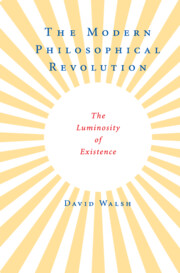Book contents
- Frontmatter
- Contents
- Preface
- Introduction
- 1 Kant's “Copernican Revolution” as Existential
- 2 Hegel's Inauguration of the Language of Existence
- 3 Schelling on the Beyond of Existence
- 4 Nietzsche: Philosophy as Existence
- 5 Heidegger's Achievement Despite the Betrayal of Philosophical Existence
- 6 Existence Without Refuge as the Response of Levinas
- 7 Derrida's Dissemination of Existence as Différance
- 8 Kierkegaard's Prioritization of Existence over Philosophy
- Epilogue: Modernity as Responsibility
- Works Cited
- Select Bibliography of Secondary Sources
- Index
8 - Kierkegaard's Prioritization of Existence over Philosophy
Published online by Cambridge University Press: 05 June 2012
- Frontmatter
- Contents
- Preface
- Introduction
- 1 Kant's “Copernican Revolution” as Existential
- 2 Hegel's Inauguration of the Language of Existence
- 3 Schelling on the Beyond of Existence
- 4 Nietzsche: Philosophy as Existence
- 5 Heidegger's Achievement Despite the Betrayal of Philosophical Existence
- 6 Existence Without Refuge as the Response of Levinas
- 7 Derrida's Dissemination of Existence as Différance
- 8 Kierkegaard's Prioritization of Existence over Philosophy
- Epilogue: Modernity as Responsibility
- Works Cited
- Select Bibliography of Secondary Sources
- Index
Summary
The placement of Kierkegaard at the end of a study of the modern philosophical revolution must seem anachronistic. Surely the chronological pattern virtually imposes itself on a movement guided by the inner logic of its conversation. How could Kierkegaard be the exceptional voice whose contribution has not adequately been taken into account? The question challenges the depiction of the central line of modern philosophy as an unbroken discussion from the time of Kant's initiation of the existential shift. Within a context in which the respective positions were subjected to intensive scrutiny, was it possible that a major figure could be overlooked? The possibility of such an oversight reminds us of the parochial aspects of even the most ambitious philosophical projects. We realize that the revolution we have been examining has, after all, been a largely German and only lately French affair. We have said nothing about the emergence of pragmatism in America, nor have we mentioned the rise of the philosophical novel in Russia. The neglect of a solitary thinker who, while connected with the German mainline, published all of his reflections in a language spoken by only a tiny minority in Europe should not strike us as surprising. In other words we must be prepared for surprises. Indeed, even the connection between the “existential” and the “idealist” phases has been something of a more recent discovery. Within the sharp delineation of differences, the lines of continuity often become faint.
- Type
- Chapter
- Information
- The Modern Philosophical RevolutionThe Luminosity of Existence, pp. 391 - 460Publisher: Cambridge University PressPrint publication year: 2008



